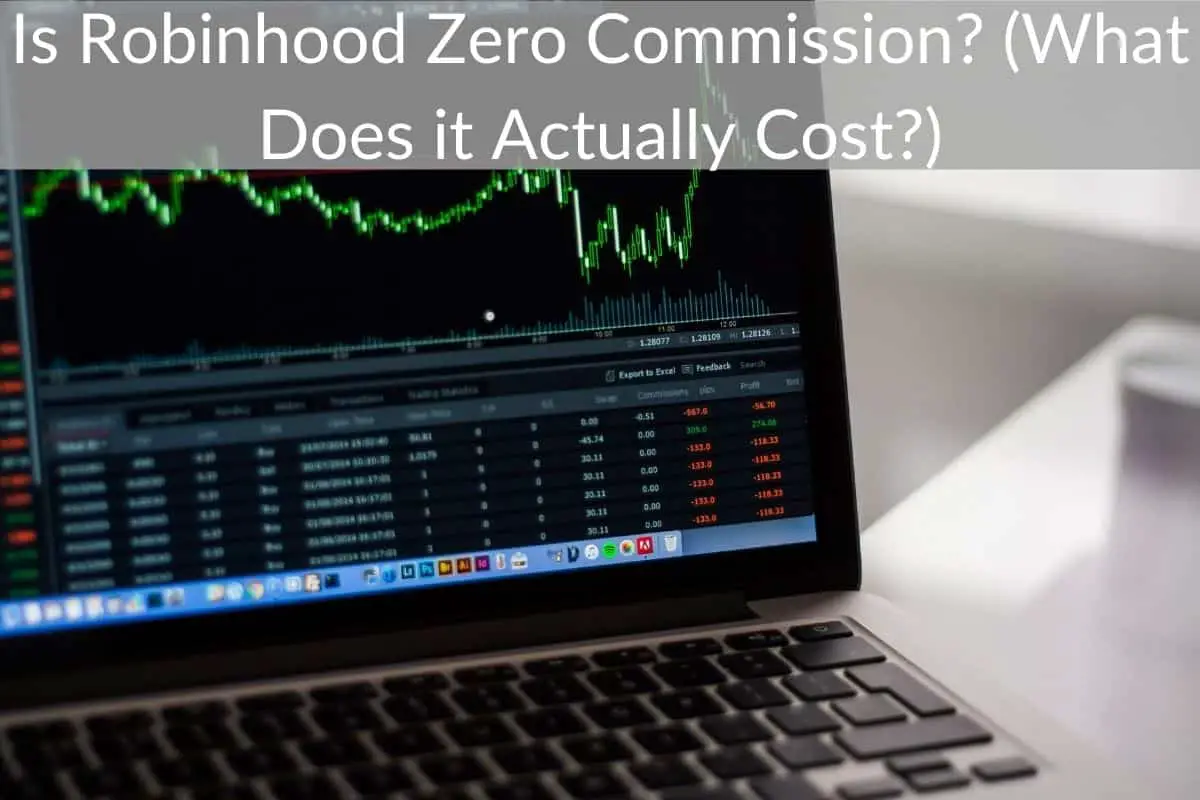Table of Contents
*This post may contain affiliate links. As an Amazon Associate we earn from qualifying purchases.
Robinhood bills itself as a commission-free platform to trade stocks, ETFs and cryptocurrencies. But is Robinhood actually zero-commission? What does it actually cost?
While it’s free to sign up for a Robinhood account and there are zero commissions for any trades. This is true whether you trade stocks, option’s or even cryptocurrency.
Robinhood does have some costs and caveats that could end up costing you money on top of the amount you’re paying to buy stocks but that is only if you purchase Robinhood Gold (their subscription service) or if you want to transfer stock from your Robinhood account to another brokerage.
Robinhood also does make money by selling your order information which may cost you a few pennies on the buy and sell side. However, if you set limit orders then you will only pay the price that you set so this isn’t a big deal for most traders.
In the rest of this article I will be diving into the actual cost of Robinhood and whether or not you should use this “zero commission” online broker.
I’ve been using Robinhood for a few years now and love it, but I want to ensure you get the most out of the platform and understand all of the potential hidden fees and extra costs associated with the app.
Is Robinhood Zero Commission? (What Does it Actually Cost?)
Before I go any further I want to be as clear as possible about the commission structure that Robinhood currently has.
Robinhood is, in fact, a zero commission online broker when it comes to buying and selling stocks, ETFs, crypto, and even options. This makes trading with Robinhood one of the best ways for beginners to start investing in the stock market.
However, while this was once what made Robinhood so unique, virtually every stock broker today offers zero commissions and zero fees. They saw how popular Robinhood was becoming so many of them copied that same tactic.
My first stock purchase I paid over $50 to buy shares from a normal brokerage so being able to make trades for free is a huge deal!
With that said, Robinhood does have a few features that inexperienced investors can take advantage of, including:
- Zero commission trading for stocks, options, and ETFs
- Zero commission crypto trading (limited)
- Fractional share investing
- Low-priced margin trading through Robinhood Gold
- Robinhood Cash Management (cash management account that comes with a debit card)
Now that you’re aware of what Robinhood offers with their online trading platform, let’s take a look at some of the hidden fees and caveats you’ll want to know before opening an account.
What Does Robinhood Actually Cost & How Do They Make Money?
For a company that doesn’t charge anything to open an account or take any commissions on the trades you make, Robinhood still makes money.
But, how? Are there hidden fees users don’t know about?
After all, Robinhood is not a non-profit, is backed by venture capital, and also recently took the company public so they will be trying to make shareholders a lot of money.
In order to do this they must be making money off you. Here’s the two ways Robinhood turns a profit (the forst being the biggest way).
1. Payment For Order Flow (PFOF)
While technically you don’t pay any fees for the trades you make on Robinhood, you might not be getting the best price in comparison to buying the same stock or option on other brokers.
This is a result of “order flow”. Essentially, when a stock is bought by you (the investor) Robinhood will send that order to a market maker who will then pay Robinhood a tiny finder’s fee.
Because a 3rd party is being involved, this will raise the share price of the stock you’re buying, costing you a few cents more than you’d otherwise pay without the additional broker.
For instance, if other trading platforms are selling a specific stock for $30, Robinhood might charge you $30.05.
While this isn’t a stark difference at face value, if you’re trading frequently those extra cents can start to add up quickly.
Keep in mind, Robinhood isn’t the only “free” trading platform that takes payment for order flow as a means of turning a profit.
A lot of the major online brokers do this to keep their platforms free of traditional commissions and fees to be able to compete with Robinhood.
One way to avoid this is to simply set a limit order when buying or selling shares, options, or crypto. Using a limit order means you will only be able to buy the stock at the price you set.
So based on the example above rather than you paying $30.05 you can set the limit order to only buy at $30. Now the market maker will still likely make a few pennies on your order as they might not fill it until the stock price drops a tiny bit so they can make a profit however that extra profit isn’t really coming out of your pocket at that point.
2. Robinhood Gold
For $5 per month, you can sign up for Robinhood Gold, which is a premium product that gives you access to additional features you won’t get with a regular free account, including:
- Margin Trading: or “Gold Buying Power” as Robinhood calls it is essentially 2x margin on your account. You don’t pay interest, though, which is different from other margin accounts and your margin power is predicated on the flat fee you pay per month.
- After Hours/Pre Market Trading: You get access to after hours and pre market trading
- Larger Instant Deposits: Unlike the free Robinhood account, Gold members get instant access to additional funds, including those made from the sale of a security. With the standard plan, you can get up to $1,000 in instant buying power while Robinhood Gold is up to $5,000.
- Level II Market Data: get real time data to learn more about a stock other than just the best bid or best ask on the market.
- Pro Research: professional research provided by Morningstar
While Robinhood Gold is technically an added charge at $5 per month, you don’t need to sign up for it.
You can get by comfortably with a Robinhood Instant account or a Robinhood Cash account. Both are free to open and offer enough perks to be able to buy and sell stocks, cryptocurrencies, and ETFs.
3. Additional Fees
There are some additional hidden fees that you should know about before opening an account with Robinhood. Let’s take a look at a few of them below:
- If you want to transfer an account to a competing broker, Robinhood charges $75 via the ACAT system. Paper statements are $5 each and paper confirmations are $2 each.
- There is a $10 surcharge per trade when an account becomes restricted, no matter the reason. If you place an order over the phone with a live representative it will also cost an additional $10.
- Robinhood charges $50 per transaction when trading a foreign security. Cancelling a foreign security or making an adjustment to the trade is $15. Canadian and Euroclear securities will run you $35 per trade.
- Regulatory fees — including the SEC fee which is 2.31 per $100,000 of principal and only valid for sales — are passed onto Robinhood users.
- Wire transfers are pretty steep with domestics costing $25 and $50 for international wire transfers.
- TAF (Trading Activity Fee) which is 0.00119 cents is applied only to stock sales and is rounded up to the nearest cent. TAFs are capped at $5.95 per transaction.
Final Thoughts
So…is Robinhood zero commission? Yes, but there are caveats and hidden fees you may not know about before joining.
All in all, though, if you’re trying to get started investing in stocks or ETFs with a small amount of cash, Robinhood might be ideal for you.
Just make sure you’re aware of the fees associated with the platform before opening an account.

